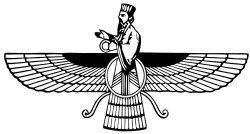Difference between revisions of "Astrianism"
Jump to navigation
Jump to search
Terranihil (talk | contribs) |
Terranihil (talk | contribs) |
||
| Line 1: | Line 1: | ||
{{Astamrianism sidebar}} | {{Astamrianism sidebar}} | ||
| − | '''Astamrianism''' or '''Phansyrmesta''' ([[ | + | '''Astamrianism''' or '''Phansyrmesta''' ([[Vektranamic language|Vektranmic]]: Ⲫⲁⲛⲋⲣⲙⲉⲋⲧⲁ, Fansrmesta) is one of [[Terraconserva|Terraconserva's]] oldest continuously practiced religions, based on the teachings of the [[Vektranmic language|Vektranmic]]-speaking prophet [[Astamer]] (Vektranamic: Ⲁϣⲧⲁⲙⲣⲁ, Aštamra). Astamrianism has a dualistic cosmology of good and evil and an eschatology, predicting the ultimate conquest of evil by good. Astamrianism exalts an uncreated and benevolent deity, [[Ahuda]] (Wise Lord), as its supreme being. The unique historical features of Astamrianism, such as its monotheism, messianism, judgment after death, heaven and hell, and free will may have influenced other religious and philosophical systems, including Judaism, Gnosticism, Christianity, and Islam. |
Revision as of 15:29, 28 April 2021
| Part of a series on |
| Astrianism |
|---|
 |
Astamrianism or Phansyrmesta (Vektranmic: Ⲫⲁⲛⲋⲣⲙⲉⲋⲧⲁ, Fansrmesta) is one of Terraconserva's oldest continuously practiced religions, based on the teachings of the Vektranmic-speaking prophet Astamer (Vektranamic: Ⲁϣⲧⲁⲙⲣⲁ, Aštamra). Astamrianism has a dualistic cosmology of good and evil and an eschatology, predicting the ultimate conquest of evil by good. Astamrianism exalts an uncreated and benevolent deity, Ahuda (Wise Lord), as its supreme being. The unique historical features of Astamrianism, such as its monotheism, messianism, judgment after death, heaven and hell, and free will may have influenced other religious and philosophical systems, including Judaism, Gnosticism, Christianity, and Islam.